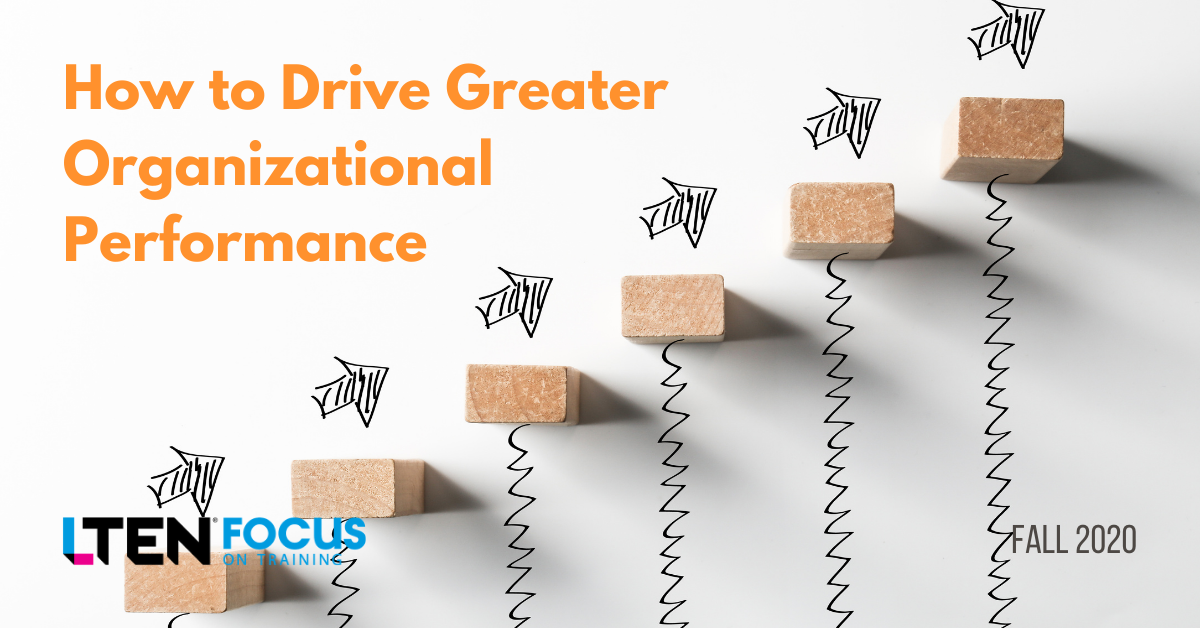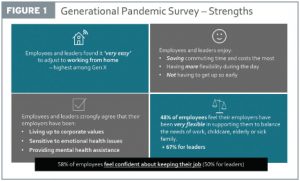
FEATURE STORY – By Giselle Kovary, M.A., and Susan Armstrong
How to Drive Greater Organizational Performance
As the world was forced to respond to the COVID-19 pandemic, organizations, leaders and learning and development (L&D) professionals had to quickly embrace working from home, managing reduced (or increased) business demand and supporting employee motivation, engagement and learning through virtual means.
In May our generational pandemic survey collected 233 responses from 15 countries, 20 U.S. states and five Canadian provinces. All four generations in the workforce (baby boomers, Gen Xers, millennials and Gen Zs) were represented. However the data is not representational, as the response rates were higher for Gen Xers than other generations.
 Strengths
Strengths
Some of the key strengths for employees that emerged from the data included an easy transition to working from home, enjoying greater flexibility and feeling well supported by their organizations to handle both mental health issues and balancing the needs of work and family.
In addition, both employees and leaders indicated that the relationship with their senior leader improved during this pandemic through increased communication and trust. Interestingly, Gen Z employees rated increased trust the highest among all generational cohorts.
Challenges
The effects of the lockdown, social distancing and changes in daily routines resulted in challenges for all generations. Staying motivated, managing mental and physical health and coping with spending “too much time working” were the top three challenges for all. In particular, leaders indicated that they have been participating in more meetings than pre-pandemic, which on average represents 55% of their workday.
Interestingly, leaders across the generations highlighted different challenges in leading their remote teams. Baby boomers rated continuing to provide learning and development opportunities as their biggest challenge, while Gen Xers struggle with empowering and delegating to employees, and millennial leaders indicated that providing coaching and feedback has been a challenge given the remote nature of work.
Opportunities
The survey identified four opportunities that organizations, leaders and L&D teams can focus on:
- Engaging a multi-generational workforce.
- Employee engagement is always critical, but it is especially relevant now, as we must continue to drive employee motivation, connection and performance. An emphasis should be placed on:
-
- Frequent, high-touch communication.
- Enhanced team collaboration through online group events and social distancing in-person events with those in close geographic regions.
- Building and maintaining trust by being transparent and forthcoming with information and delivering on organizational promises.
- Supporting employees in addressing mental health issues. COVID-19 has been hard on everyone, especially those who already face mental health challenges. Ongoing dialogue, regular check-ins and creating a safe space to share struggles and seek support are very important. This is particularly important for younger employees, as 77% of Gen Z respondents said they often find themselves worried or stressed.
- Retaining top performers
- Some may argue that the old adage “the war for talent” is now over, due to higher levels of unemployment. However, top performers tend to be top performers regardless of where they work. The best and brightest are always in demand, sometimes even more so during a recession, as they deliver greater results on average and provide high levels of value to the organization.
- Focusing on retaining top talent means we need to continue to invest in the following activities during this pandemic:
-
- Providing learning, developing and growth opportunities.Offering stretch assignments.
- Creating opportunities for lateral or upward career progression.
- Soliciting feedback on how processes and cultural practices can be improved.
- Providing mentorship opportunities – formal or informal.
- Rewarding and recognizing high performance.
- Investing in these practices can dramatically increase retention and loyalty. Respondents in the survey indicated that based on their experience with their employer during COVID-19, their loyalty is likely to stay the same or increase, which was especially true for Gen Zs who rated an increase in loyalty higher than other generations.
- Ensuring diversity and inclusion remains a top priority
- Diversity, inclusion and equity is no longer a nice-to-have, it is a must-have in high-performing organizations. There is still a lot of work to be done to reach our desired state, but the Black Lives Matter movement has shone a light on the need for everyone, including organizations, to evaluate biases and change practices to ensure greater inclusion and representation. Our current reality presents an unprecedented opportunity for L&D to make a sustainable impact on organizational performance. The time to act is now.
- Gen Zs expect this of us. An impressive 100% of Gen Z survey respondents said they “want to live and work in a diverse community.” All people practices, including learning and development, need to be evaluated to ensure we are providing opportunities for underrepresented voices to be heard, and ensuring all employees have equal opportunities to grow, develop and progress in their careers.
- Maintaining and increasing performance
- During this pandemic, there have been added pressures for all teams to be resilient, adaptable and embrace ambiguity. To ensure we can maintain and increase individual and team performance, we must focus on three key actions:
-
- Coaching and feedback: Provide regular virtual sessions and leverage technology to evaluate and identify areas for development.
- Virtual training workshops: Focus on skills that support three key areas: solving current business needs, supporting employee wellness and increasing team collaboration and reducing conflict.
- Developing future-state competencies: Identify and build training that develops the competencies needed to excel in the future as influenced by this pandemic. Skills such as resilience, tapping into motivation, time management, cross-cultural communication, empathy and creativity will all set employees up for success during this pandemic and beyond.
Our current reality presents an unprecedented opportunity for L&D to make a sustainable impact on organizational performance. The time to act is now. Our multi-generational work forces have communicated what they need from us to succeed.
Conduct a mini needs analysis in your organization to identify the priorities and then develop interactive, engaging programs to improve knowledge, skills and engagement. By providing upskill opportunities for employees, you will be preparing your organization to face a future that is still unknown with the right competencies and skills to excel.
Giselle Kovary, M.A., is president of n-gen People Performance and managing partner of Global Training Transformation. Email Giselle at gkovary@ngenperformance.com. Susan Armstrong is managing partner of Global Training Transformation. Email Susan at susan@gttworldwide.com.








